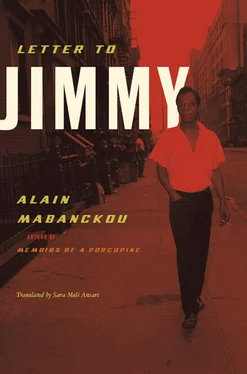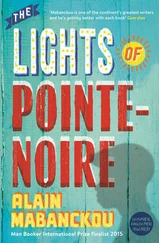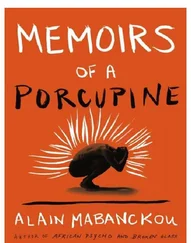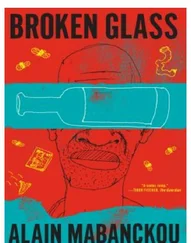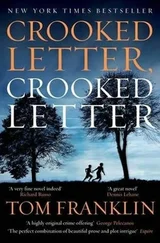Seek shelter? Where? In a movie theater? There you had to fear the wandering hand of an older man, or another man who, standing in front of a display of pornographic magazines, looks at you with eyes that say everything: “There were all kinds of men, mostly young and, in those days, almost exclusively white.” 79
Richard Wright would never see eye to eye with you about your lifestyle. Homosexuality for him was linked to perversion. He does not shy away from generalizations, since he remarks to one of his friends, when talking about you, “It’s always the same thing with these homos” or, again, “Sure he can write, but he’s a faggot.” 80
•••
The publication of Giovanni’s Room in 1953 is quite an event. There are three reasons for this: the novel does not take place in America, there are no black characters, and the homosexuality of the hero is clearly stated.
France is the backdrop for Giovanni’s Room , not without reason. This spatial displacement reveals your thirst for freedom, your desire for openness and to break with the protest novel. Your main character breaks free from the archetype of the African-American novel: David is not black. He resembles nothing of John Grimes, your “double” in Go Tell It On the Mountain, considered at the time to be one of the first books about the black condition.
David frequents the homosexual milieu in Paris while his fiancée, white and American, is traveling in Spain. The novel takes a unique look at the quest for sexual identity, in this way building upon reflections made in “The Preservation of Innocence” and that you pursue, near the twilight of your life, in “Freaks and the American Ideal of Manhood.”
On the back cover of the first paperback edition we get a glimpse of the media buzz.
The New York Herald Tribune celebrates “the story of a young American man grappling simultaneously with the love of a man and a woman,” before adding that, “Mr. Baldwin navigates these issues with an exceptional degree of candor, and yet, with such dignity and intensity that he avoids the trap of sensationalism.” The Evening Standard , for their part, is even more won over: “Probably the best and certainly the most frank novel about homosexuality in years. .”
The story is heart wrenching, as much for the characters’ anguish as for the beauty of the writing, rendered lively and sensual through its poetic intensity and the strength of its imagery. Rather than mulling over the collective unrest over the black condition, you explore individual desperation, the hopeless tragedy of a man confronted with solitude and accepting a fate that drives him to self-destruction. In this lies the meaning behind the entire body of your work; understanding the collective through the individual.
Giovanni’s Room nevertheless unleashed some very negative reactions in the black American community. The Black Panther activist, Eldridge Cleaver, does not mince his words and rejects in passing your entire body of work: “There is in the work of James Baldwin the most agonizing, complete hatred for Blacks, in particular for himself, and the most shameful, ardent and servile attraction to Whites than can be found in the work of any other black American writer of our day.” 81
Is this to say that the novel is deaf to the cries of the oppressed, impervious to the power of protest? In a few lines — no doubt quickly forgotten by your opponents — you give a reading of history distanced from the clash of civilizations, with all of the pain, bitterness, humiliation and rape it entails. At base it is a cry for reconciliation, for forgiveness and for redemption that we hear in the character David’s confession on the first page: “My face is like a face you have seen many times. My ancestors conquered a continent, pushing across death-laden plains, until they came to an ocean which faced away from Europe into a darker past.”
•••
Another Country , published in 1962, points to the source, beyond racial and gender divisions, of what divides an American society that clings to maintaining its puritanical appearances. This is a book that arouses once again the wrath not only of the black community, but also of prudish critics. When he reviews the novel for the New York Times , Paul Goodman issues the verdict of a cantankerous schoolteacher: “It is mediocre. [. .] he [Baldwin] must write something more poetic and surprising.” 82
Paul Goodman is bewildered by the analytic approach of the characters and by the stark portrayal of racial prejudice. Goodman expects a sentimental novel that will reassure him, that will conform to the understanding he has of black American literature. Where this critic searches for something more surprising and poetic, you offer the raw reality of male-female relations, even relations where ambiguity and sexual confusion are deliberately displayed.
The first part of the book brings together a black male musician at the brink of total destruction, and Leona, a white woman he is supposed to humiliate by making love to her: “Here the act of sex is nothing more than the realization of a fantasy in which the black man has been implicated by the white man. Rufus falls psychologically and ends up committing suicide because he agrees to play the role that the white man had assigned to him in his imagination.” 83
Behind the sexual act you describe, the history of America is at stake.
“And [Leona] carried him, as the sea will carry a boat. . They murmured and sobbed on this journey [. .] Each labored to reach a harbor [. .] He wanted her to remember him the longest day she lived. And, shortly, nothing could have stopped him, not the white God himself nor a lynch mob arriving on wings. Under his breath he cursed the milk-white bitch and groaned and rode his weapon between her thighs.” 84
With virtuosic skill, you distill in this heartbreaking sexual act all of the expected elements of the African-American experience: a crossing by boat, the predictable lynching of a black man for having approached a white woman, the revenge of a black man exacted on a white woman who has strayed from her area of control.
But when Rufus asks Leona what she is doing in the middle of Harlem, in a nightclub teeming with people of color, she responds most naturally:
“[Black people] didn’t never worry me none. People’s just people as far as I’m concerned.”
How do you hold on to a love like that when you have to endure the glances of others? Can a sexual act that occurs in the darkness and intimacy of a shabby room in Harlem bond together two beings, unite them the following day, when they are faced with gossip?
There are no easy battles: “They encountered the big world when they went out into the Sunday streets. [. .] and Rufus realized that he had not thought at all about this world and its power to hate and destroy.” 85
For Goodman, there is nothing surprising or poetic in this, nothing, despite the disorder and the internal conflict of the characters who are haunted by this sexual experience, no — all of that passes unnoticed by our critic.
6. between the black American and the African: misunderstanding
In France, you hope to make progress on your quest for self-discovery, far away from the limitations imposed on you by your own country. Such a search proves to be more complicated than you imagined. The experience of migration places you face to face with other cultures, other people, and leads you to reconsider your ideas. Leeming writes that, ironically, once settled in Europe, you are forced to admit that the “old” continent had not in any way changed your heritage, and that the transformation would never occur: you would remain a black man as you had been in New York. Europe helps you, at best, understand what it means to be a black man. The Harlem ghetto had aroused in you a “. . sense of congestion, rather like the insistent, maddening, claustrophobic pounding in the skull that comes from trying to breathe in a very small room with all the windows shut.” 87
Читать дальше
